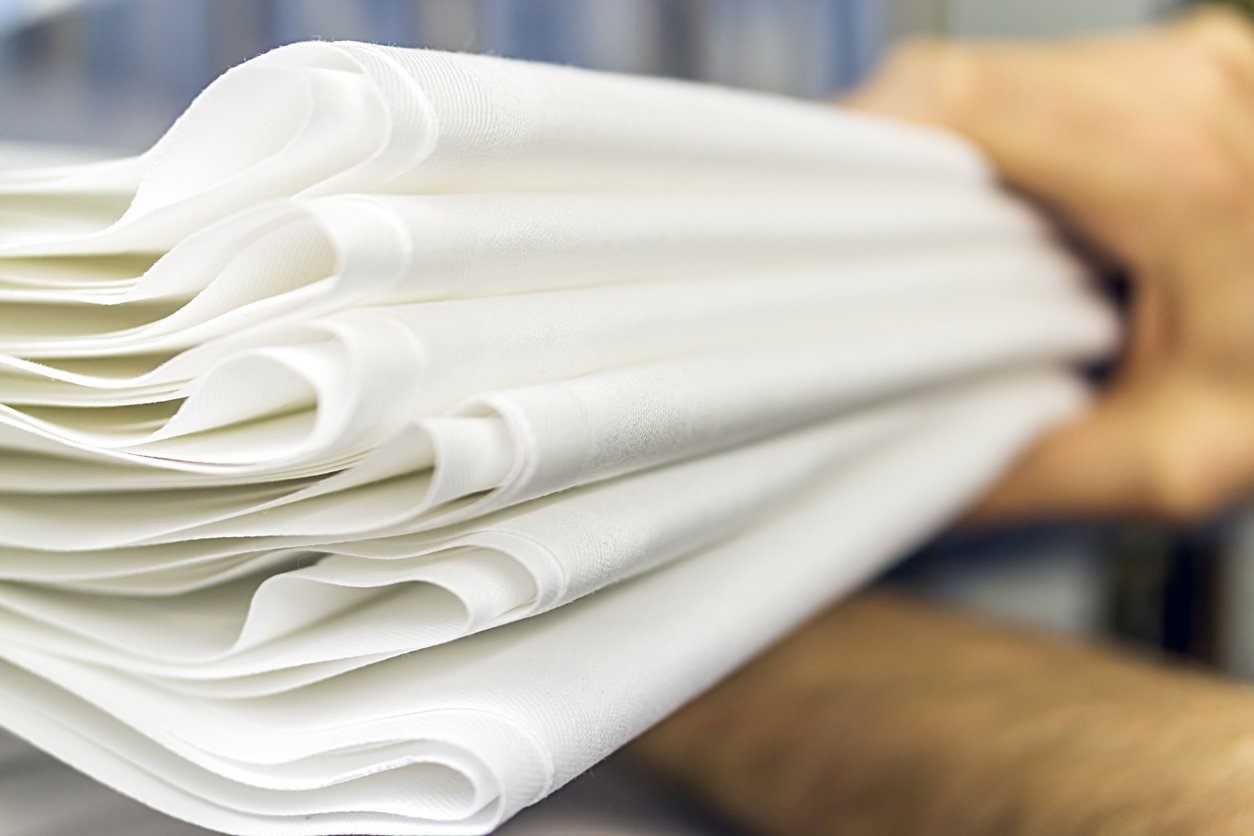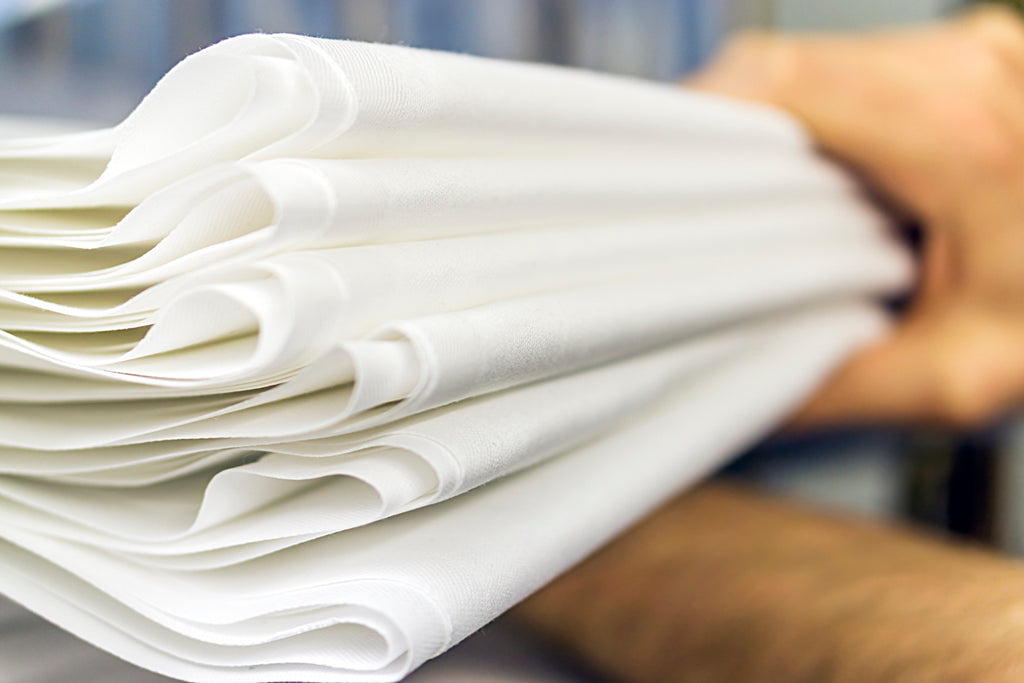12 Illuminating Facts You Need to Know About Your Bedding


Ah, sleep. If you don't get enough of it, it can foul up your entire day. You'll be cranky, sluggish, have the attention span of a one year old, unable to concentrate and maybe even get headaches. But if you have a night of peaceful slumber, you could be bursting with energy, ready and raring to go first thing in the morning and able to get a lot of stuff done during the day.
Most likely you're aware that we spend a third of our lives in bed—that's a lot of time in bed! But did you know that one of the causes of a good night's sleep is your sheets, pillows, and comforters? No, we're not pulling your leg. There are many times that the marketing jargon of bedding companies can leave most of us a bit confused. So this week we're going to enlighten you with 12 facts about beds, bedding, and how to make the most of your time spent dreaming.
- Stay away from sheets in which their label reads: "permanent press," "wrinkle-free" and "easy care." What do these labels mean? The sheet's material has a poisonous chemical called formaldehyde resin. This chemical won't wash out no matter how many times you wash your sheets.
- In Europe, it's normal for people to sleep only with a fitted sheet and a duvet. Here in the United States, there's 40% of the population who do the same thing.
- Be careful of bedding labeled "organic cotton." Don't be fooled into thinking that this means the fabric doesn't have harmful chemicals. You need sheets that have no hazardous chemicals from the whole manufacturing procedure. These types of sheets are genuinely organic.
- We all know that our sheets need to be washed once a week; but it's essential that you wash your duvets, comforters, bedspreads, and pillows as well. Why? Over time, these items become loaded with your dead skin and dust mites. Much of the synthetic and down materials are okay to throw right in your washer at the start of every season. Always wash in cold water on the delicate—or gentle—cycle. Why shouldn't you soak in hot water? The fibers will get broken down, and your bedding will wear out faster in hot water. Some people say, "Cold water won't kill germs." In actuality, it's the laundry detergent that kills the germs, not the temperature of the water.
- Only fill the washer half full when washing your bedding. Have you ever pulled your sheets from the dryer only to find that they're a tangled up mess? Then you might spend 10 minutes trying to untwist them—or longer if they're tangled. It will happen when you overload your dryer. So when you dry your bedding, don't load your dryer to its full capacity, fill it only halfway; this gives the fabric plenty of room to fluff up. Likewise, you can toss in a couple of brand new tennis balls to increase the fluff factor.
- We were always taught to believe that the larger the thread count is, the better quality it is. Well, this is a trick that marketing companies like to use. It's not the thread count of your bedding that matters but rather the thread quality. The fiber's length is what determines the quality. Longer is best. For example, while there's a wide variety of cotton, you should search for "long strand cotton" rather than thread count; Egyptian cotton is one of the better kinds of cloth because its fiber is softer, stronger and longer.
- Most of the time in Canada and the United States, sheets are available as a four-piece set; the set includes a flat sheet, a fitted sheet, and two pillowcases. However, in China, a four-piece set is sold with two pillowcases, a duvet cover and a flat or fitted sheet.
- Would you like to know the least expensive way to update your bedding? Change out your pillowcases every six months to one year. It is a great way to save money and spruce up your sheets at the same time!
- For those that don't like to iron—is there anyone out there who does?—here is a great technique for you. Remove your bedding from your dryer while they're still slightly damp and warm. Promptly put them on your bed to thwart wrinkles. Voilà—just like ironing without the hassle!
- When you're shopping for sheets, you might want to consider the feeling you like when you're in your bed. There are four standard kinds of weaves. Each weave will feel entirely different when it comes in contact with your skin because each design has its texture. The patterns are:
- Percale – This fabric is crisp and refreshing. It's perfect for those hot summer months or for those people who are warm while they sleep.
- Sateen – This material is smooth and soft with a little shine to it. Sateen is somewhat warmer than percale and great for early spring or late fall. Of course, if you're a person that's cold most of the time, you can put this on your bed in the summer too.
- Jersey – Have you ever had a favorite t-shirt that you've slept in merely because it was so comfortable? This cloth is like a t-shirt. It's stretchable and quite soft, and many people use it during late fall and the winter months.
- Flannel – This is the thickest and warmest of the four weaves. It's also a little fuzzy which make it fantastic for those long, cold, wintry nights.
- If you're thinking of purchasing a set of Egyptian cotton sheets, make sure you read the package thoroughly and note that you're getting sheets with 100% Egyptian cotton. A few companies will insist that their sheets are Egyptian cotton—and that may be true. However, even though they have the high price of Egyptian cotton sheets, what companies may not tell you is that it's only a small percent of Egyptian cotton and blends with another kind of cloth. So read the package carefully to ensure that you're indeed getting the 100% Egyptian cotton sheets that you want!
- Do you remember your Mom always telling you—or yelling at you—to make your bed? Well, now there's a bit of controversy as to whether this is a good idea or not. It's a perfect way to achieve a task right after waking up. And it does make the bedroom look neater. But does it keep the dust mites to a minimal amount? Many people say no. These people say that when you make up your bed, you're just trapping moisture and your sweat in the sheets and covers. It's a dust mite's favorite environment; apparently, leaving the bed unmade will dry up the moisture and air out the bedding making the dust mites search for another home. So should you make your bed or not? That's entirely up to you.





